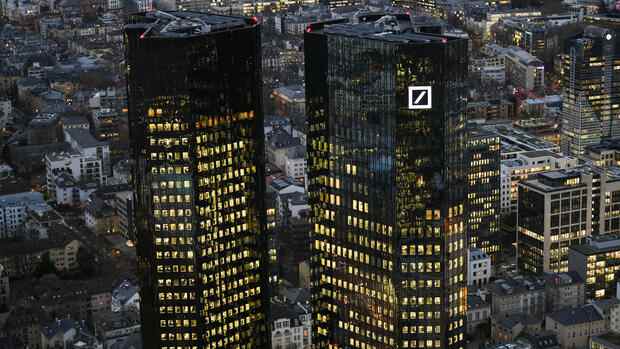Frankfurt Despite the energy crisis and the threat of recession, Deutsche Bank made surprisingly good earnings in the third quarter. The institute’s net profit rose to 1.1 billion euros, more than five times as high as the previous year’s figure of 194 million euros. On average, analysts had only expected a net profit of 835 million euros.
The institute’s gross income increased by 15 percent to 6.9 billion euros. All the important divisions of the institute contributed to this, but above all the corporate customer business. In a brief analysis, the analysts at MM Warburg spoke of “impressive growth”.
“We have significantly improved Deutsche Bank’s earning power and are right on track to achieve our goals for 2022,” commented CEO Christian Sewing on the result. The bank had set itself the goal of a return on tangible equity of eight percent and income of 26 to 27 billion euros. In the first nine months of 2022, the institute was also successful with 8.1 percent.
In its quarterly report, however, the institute adopted a more cautious tone when looking to the future. Due to the “continued good business development”, the bank sees the possibility of exceeding its earnings forecast “for the full year 2022.” On the other hand, the institute only says about the central return target, “in the last quarter of 2022 the group will continue to work towards achieving its financial targets to reach”.
Top jobs of the day
Find the best jobs now and
be notified by email.
This seems to be becoming increasingly difficult: the current environment is “increasingly characterized by challenges, and cost pressure has increased,” writes the institute. In the second quarter, the institute reaffirmed its earnings and return targets without any major explanations.
Corporate and retail clients balance investment banking
However, there is still little to be seen of these growing challenges in the Institute’s figures. Pre-tax profits in investment banking and wealth management shrank. However, significantly higher profits in the corporate and private customer business were able to more than compensate for this dip.
risk provision
350
Million Euros
Deutsche Bank set aside for bad loans in the third quarter – three times as much as before.
Risk provisions for bad loans tripled to EUR 350 million. However, the bank stuck to its forecast that risk provisions for the year as a whole will amount to no more than 0.25 percentage points of the bank’s loan book, which continues to grow. However, the burdens could be higher next year – and according to CFO James von Moltke, they could also be a few hundredths of a percentage point above the “normalized range” of 0.2 to 0.25 percentage points.
So far, there has been little sign of this: the bank has benefited from the rate hikes by the central banks on the one hand and from the continued growth in the lending business on the other. Both ensured a significant increase in net interest income, which was a third higher than in the previous year and nine percent higher than the result in the second quarter.
The weakness in investment banking was triggered by a sharp decline in underwriting and advisory businesses. Because of the turbulence on the financial markets, it was practically impossible to earn anything with the support of stock and bond issues, and significantly less than before with the advice on IPOs and other capital market issues. According to insiders, Deutsche Bank recently fired several dozen investment bankers in London and New York in these areas.
On the other hand, the institute’s bond and foreign exchange trading proved to be a stable source of income, with income well above the previous year’s figure. Compared to the second quarter, however, the bank also received less in this segment.
IT project is delayed
The reaction on the stock exchange was mixed. After the share had risen by around 20 percent since the beginning of the month, it fell by almost one percent on Wednesday after an interim increase.
While the numbers are solid and business has continued to improve under CEO Christian Sewing, that’s not entirely surprising, wrote US bank JP Morgan analyst Kian Abouhoussein. He pointed out that the costs were higher than expected and that the share price had recovered significantly recently.
The institute’s costs fell by eight percent to five billion euros in the third quarter. However, the expenses adjusted for conversion costs and bank levies increased by four percent to 4.8 billion euros compared to the previous year.
According to the bank, this was primarily due to exchange rate effects. The cost/income ratio was 72 percent. That is, the bank spent 72 cents to earn one euro.
The integration of Postbank’s IT systems into Deutsche Bank’s systems is also proving to be more difficult than planned. The “Project Unity”, with which the bank wants to save 300 million euros a year in private customer business, has been delayed again. After the bank only postponed the completion of the integration work until the beginning of 2023 three months ago, it is now assuming a date of mid-2023.
Instead of the additional costs of 150 million euros, there is now talk of 200 million euros in extra expenditure. One of the reasons for this is that the two separate systems and a test platform must continue to be operated until then and additional personnel costs are incurred.
More: Investor Davide Serra: “Germany should build a statue of Christian Sewing”
